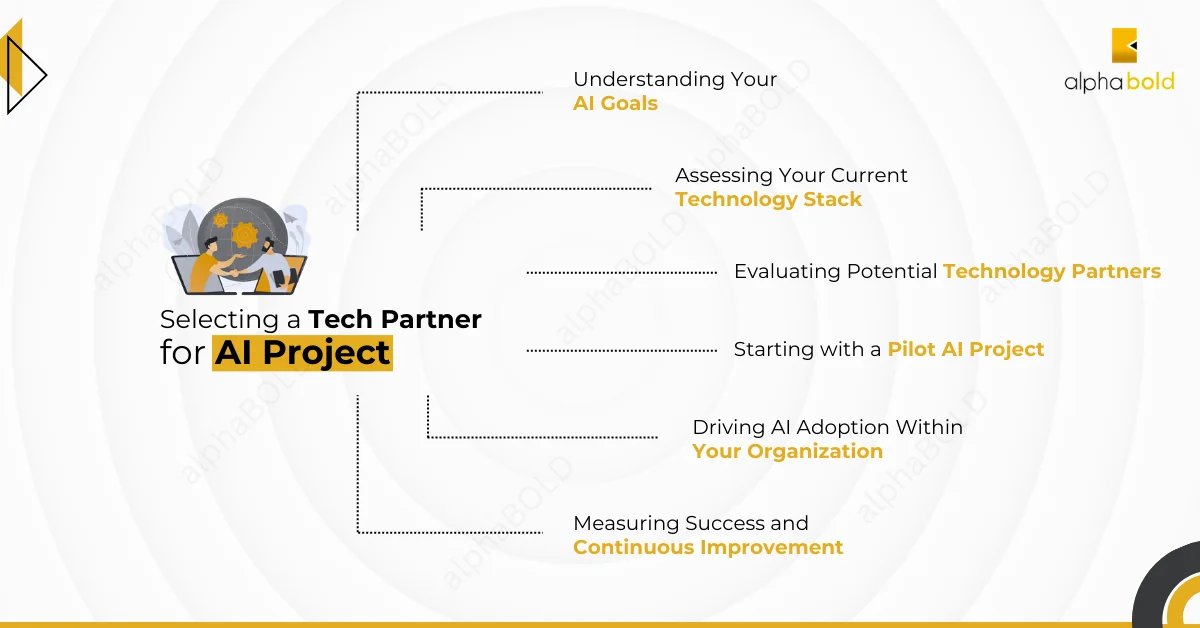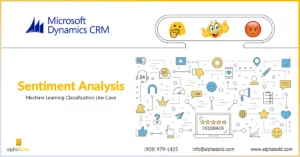Introduction
This article will explore the key considerations for selecting a tech partner for AI projects. We will discuss the importance of understanding your AI goals, assessing your current technology infrastructure, evaluating potential partners, and the benefits of starting with a pilot project. Additionally, we will highlight the role of a technology partner in driving AI adoption and measuring project success. Using AlphaBOLD, a trusted Microsoft and NetSuite partner, as an example, we will illustrate how an experienced partner can help you navigate the complexities of AI implementation and achieve your business objectives.
Implementing Artificial Intelligence (AI) in a business can be a complex and daunting task for decision-makers. The landscape of AI technology is vast and rapidly evolving, presenting numerous challenges related to understanding what AI can achieve, how to effectively implement it, and how to drive its adoption within the organization. Moreover, ensuring that the AI project aligns with the company’s strategic goals and can be measured for success adds another layer of complexity.
Selecting a tech partner for AI projects is crucial for navigating these challenges and ensuring the success of your AI initiatives. A knowledgeable and experienced partner can provide the expertise, tools, and support needed to implement AI effectively. 70% of businesses that work with AI partners see faster results from their projects. They can help you define clear objectives, integrate AI with your existing technology stack, and drive its adoption across your organization. Furthermore, a good technology partner can guide you through the pilot phase and help scale your AI projects based on proven success metrics.

Understanding Your AI Goals
Defining Objectives for your AI Project:
The first step in any successful AI project is defining clear and specific objectives. Knowing exactly what you wish to achieve with AI sets the foundation for the entire implementation process. Without clear goals, it’s easy for projects to lose direction, resulting in wasted resources and suboptimal outcomes. When defining your AI objectives, consider the following:
- Identify Business Problems: Determine the specific problems or inefficiencies within your organization that AI can address. For example, you might aim to improve customer service response times, enhance inventory management, or predict equipment maintenance needs.
- Set Measurable Outcomes: Establish concrete metrics for success. These could include reducing operational costs by a certain percentage, increasing sales conversion rates, or improving the accuracy of demand forecasts.
- Prioritize Initiatives: Not all AI projects will have the same impact. Prioritize initiatives based on potential ROI, feasibility, and alignment with strategic goals.
Having clear, measurable objectives will guide your AI implementation, ensuring that all efforts are focused on achieving tangible business benefits. Selecting a tech partner for AI projects can help ensure that your objectives are defined from the start.
Strategic Alignment Between Stakeholders:
Aligning your AI goals with your overall business objectives is crucial for ensuring that AI initiatives contribute meaningfully to your organization’s success. AI should not be implemented in isolation; instead, it should support and enhance your broader strategic aims. Here’s how to ensure alignment:
- Review Strategic Plans: Start by reviewing your company’s strategic plans and objectives. Understand the long-term vision and key priorities for growth, efficiency, and innovation.
- Integrate AI with Core Functions: Identify how AI can enhance core business functions such as operations, marketing, finance, and customer service. For example, if improving customer satisfaction is a strategic priority, AI could be used to personalize customer interactions and provide faster service.
- Stakeholder Involvement: Engage key stakeholders in defining AI goals. This includes executives, department heads, and IT leaders who can provide insights into strategic priorities and operational needs.
- Continuous Evaluation: As AI projects progress, continuously evaluate their impact on strategic objectives. Adjust goals and approaches as necessary to ensure ongoing alignment with business priorities.
By defining clear AI objectives and ensuring they align with your strategic goals, you set the stage for a successful AI implementation that delivers meaningful results. Selecting a tech partner for AI projects helps ensure that your AI initiatives are not just technologically advanced but also valuable and relevant to your business’s long-term success.
Ensure your Organization and Team are Prepared for your AI Project.
Download the checklist today to gain a comprehensive guide on approaching a new AI project.
Download NowAssessing Your Current Technology Stack
Existing Infrastructure:
Before embarking on an AI implementation journey, it is essential to thoroughly evaluate your existing technology infrastructure. Understanding your current capabilities and limitations will help you identify the necessary upgrades and ensure a smooth integration of AI technologies. Here’s why this step is critical:
- Identify Gaps and Needs: Assessing your current infrastructure allows you to identify gaps that need to be addressed. This might include insufficient data storage, outdated hardware, or the lack of necessary software tools.
- Evaluate Data Readiness: AI relies heavily on data. Ensure that your data management systems are capable of handling large volumes of data, and that your data is clean, well-organized, and accessible.
- Infrastructure Scalability: Consider whether your current infrastructure can scale to meet the demands of AI. AI applications often require significant computational power and storage capacity, so it’s important to assess whether your existing systems can be scaled up or if new investments are needed.
- Security and Compliance: Ensure that your current technology infrastructure meets the security and compliance requirements for handling sensitive data. AI projects can involve significant data processing, making robust security measures crucial.
By thoroughly evaluating your existing infrastructure, you can better understand the foundation upon which your AI projects will be built and make informed decisions about necessary upgrades and investments. Selecting a tech partner for AI projects can further ensure that your infrastructure assessment is comprehensive and aligned with your AI goals.
Compatibility and Integration:
Selecting a tech partner for AI projects familiar with your existing technology stack is crucial for seamless AI implementation. A partner with expertise in your current systems can help ensure compatibility and smooth integration, minimizing disruptions and maximizing efficiency. Here’s why this is important:
- Seamless Integration: A technology partner who understands your existing systems can integrate AI solutions more effectively. For example, AlphaBOLD’s expertise in Microsoft and NetSuite means they are well-equipped to ensure that new AI tools work seamlessly with these platforms.
- Leverage Existing Investments: Choosing a partner familiar with your technology stack allows you to leverage existing investments in software and infrastructure. This can result in cost savings and reduce the need for extensive new purchases.
- Tailored Solutions: A partner with experience in your specific technology environment can tailor AI solutions to fit your unique needs and workflows. This customization ensures that the AI implementation addresses your specific challenges and opportunities.
- Efficient Troubleshooting: When issues arise, a partner knowledgeable about your existing systems can troubleshoot more efficiently, reducing downtime and ensuring that your AI systems remain operational and effective.
Selecting a tech partner for AI projects ensures your AI projects are built on a deep understanding of your existing technology stack. For instance, if your organization primarily uses Microsoft and NetSuite solutions, partnering with AlphaBOLD ensures that your AI projects are built on a deep understanding of these platforms. This familiarity enables AlphaBOLD to provide customized AI solutions that integrate seamlessly with your existing systems, ensuring a smoother implementation process and faster realization of benefits.
By assessing your current technology stack and choosing a partner familiar with your existing infrastructure, you set the stage for a successful AI implementation that is both efficient and effective. This strategic approach helps ensure that your AI initiatives are well-supported by your existing technology investments and are positioned for long-term success.
Evaluating Potential Technology Partners
Experience and Expertise:
When selecting a tech partner for AI projects, one of the most critical factors to consider is their experience and expertise in AI implementation. A partner with a proven track record can provide invaluable insights and best practices that will help ensure the success of your AI initiatives. Here’s why this is important:
- Proven Track Record: A partner with extensive experience in AI implementation will have a portfolio of successful projects. This indicates their ability to deliver effective AI solutions that meet client needs.
- Technical Proficiency: Expertise in AI technologies, such as machine learning, natural language processing, and data analytics, is crucial. A knowledgeable partner can guide you through the complexities of AI, from data preparation to model deployment.
- Innovative Solutions: Experienced partners are often at the forefront of technological advancements. They can offer innovative solutions and stay updated with the latest AI trends, ensuring your projects leverage cutting-edge technology.
Industry Knowledge:
In addition to technical expertise, selecting a tech partner for AI projects with industry-specific knowledge can significantly enhance the effectiveness of your AI projects. Industry knowledge ensures that the AI solutions are tailored to your unique challenges and opportunities. Here’s how this benefits your business:
- Contextual Understanding: A partner with experience in your industry understands the specific challenges and regulatory requirements you face. This contextual knowledge allows them to design AI solutions that are both relevant and compliant.
- Customized Solutions: Industry-specific partners can tailor AI applications to address the particular needs of your business. Whether it’s improving patient care in healthcare, optimizing supply chains in manufacturing, or enhancing customer experiences in retail, an industry-savvy partner can develop customized solutions that drive impactful results.
- Competitive Advantage: By leveraging industry-specific AI solutions, you can gain a competitive edge. A partner who understands your industry can help you implement AI in ways that differentiate your business from competitors.
Reputation and References:
Before finalizing your decision, it’s essential to check the reputation and client references of potential tech partners for AI projects. A reputable partner with positive client feedback is more likely to deliver high-quality services. Here’s what to consider:
- Client Testimonials: Review testimonials and case studies from the partner’s previous clients. These can provide insights into their strengths, reliability, and ability to deliver on promises.
- Industry Recognition: Check if the partner has received any industry awards or recognition. This can be an indicator of their expertise and standing in the market.
- References and Reviews: Ask for references and reach out to their past clients to get firsthand feedback on their experiences. Online reviews and ratings can also provide additional insights into the partner’s performance and reliability.
- Transparent Communication: Evaluate the partner’s communication and transparency during the evaluation process. A partner who is open, responsive, and willing to address your concerns is likely to be reliable and trustworthy.
For instance, AlphaBOLD’s strong reputation as a Microsoft and NetSuite partner,
combined with positive client references, underscores its ability to deliver successful AI projects. By selecting a tech partner for AI projects with a solid reputation and proven track record, you can be more confident in the success of your AI initiatives.
By thoroughly evaluating potential technology partners based on their experience, industry knowledge, and reputation, you can select a partner who will effectively guide your AI projects to success. This careful selection process ensures that your AI implementation is supported by a capable and trustworthy partner, positioning your business for optimal results.
Automate your Operations with AI
Discover how AI can transform your business by automating repetitive tasks and improving efficiency. Our experts at AlphaBOLD are ready to help you implement AI-driven solutions tailored to your needs.
Request a ConsultationStarting with a Pilot AI Project
Starting with a pilot project offers several advantages when implementing AI in your business. A pilot project serves as a proof of concept, allowing you to test AI solutions on a smaller scale before committing to a full-scale implementation. Here’s why this approach is beneficial:
- Risk Mitigation: A pilot project minimizes risk by allowing you to identify and address potential issues early in the process. This helps avoid costly mistakes and ensures that the AI solution is viable and effective.
- Proof of Concept: Pilots provide tangible evidence of the benefits AI can deliver. This can help secure buy-in from stakeholders and justify further investment in AI.
- Resource Optimization: By starting small, you can efficiently allocate resources and focus efforts on the most promising areas. This helps in optimizing budgets and avoiding unnecessary expenditures.
- Performance Measurement: A pilot project allows you to gather data on the performance and impact of the AI solution. This data is critical for making informed decisions about scaling up the project.
Partner Collaboration on a Pilot AI Project:
Collaborating with a technology partner is crucial for designing and implementing a successful pilot project. Here’s how a knowledgeable partner can support you:
- Pilot Design: An experienced technology partner can help you design a pilot project that aligns with your business objectives. They can assist in defining clear goals, selecting the right AI tools, and establishing success metrics.
- Implementation Support: A partner can provide the technical expertise needed to implement the pilot. This includes setting up the necessary infrastructure, integrating AI tools with your existing systems, and ensuring data readiness.
- Monitoring and Evaluation: Throughout the pilot, your partner can monitor performance and gather feedback. They can help identify any issues, make necessary adjustments, and ensure that the AI solution is functioning as expected.
- Training and Support: A good partner will also provide training and support to your team, ensuring that they are comfortable using the new AI tools and can effectively manage the pilot project.
Ready to Transform your Business with AI?
Contact AlphaBOLD today to schedule a consultation and explore how our expertise can help you achieve your goals.
Request a ConsultationScaling Up a Pilot AI Project:
Once the pilot project has been successfully implemented and evaluated, the next step is to scale up the AI initiative. Here’s how to approach this process:
- Evaluate Success: Assess the pilot project against the predefined success metrics. Evaluate the performance data and gather feedback from stakeholders to determine the overall effectiveness of the AI solution.
- Learn and Adjust: Identify any lessons learned during the pilot and make necessary adjustments to the AI implementation plan. This could involve fine-tuning algorithms, addressing technical issues, or improving user training.
- Develop a Scaling Plan: Work with your technology partner to develop a detailed plan for scaling up the AI project. This plan should outline the steps, resources, and timelines required for full-scale implementation.
- Incremental Expansion: Consider scaling up incrementally rather than all at once. Gradual expansion allows you to manage risks better and make continuous improvements as you go.
- Ongoing Collaboration: Maintain close collaboration with your technology partner during the scaling process. Their ongoing support will be essential for addressing new challenges, optimizing performance, and ensuring sustained success.
For example, AlphaBOLD can help you design a pilot project tailored to your specific needs, provide the technical expertise required for implementation, and support you in scaling up the project based on proven success metrics. By selecting a tech partner for AI projects and starting with a pilot, you can leverage your partner’s expertise to ensure a smoother, more effective AI implementation that delivers significant business benefits.
By starting with a pilot project, collaborating with a technology partner, and carefully scaling up based on pilot results, you can mitigate risks, optimize resources, and achieve a successful AI implementation. This approach provides a solid foundation for realizing the full potential of AI in your business.
Driving AI Adoption Within Your Organization
Accumsan lacus vel facilisis volutpat est velit egestas dui. Hac habitasse platea dictumst quisque sagittis purus sit. In tellus integer feugiat scelerisque varius morbi enim. Vulputate dignissim suspendisse in est ante in nibh mauris cursus. Aliquam sem et tortor consequat id porta nibh. Sed nisi lacus sed viverra tellus in. Purus gravida quis blandit turpis cursus in hac. Suspendisse in est ante in nibh mauris cursus. Purus gravida quis blandit turpis cursus in. Eu facilisis sed odio morbi quis commodo. Duis convallis convallis tellus id interdum velit laoreet id donec. Quis auctor elit sed vulputate mi. Semper quis lectus nulla at.
Change Management:
Effective change management is crucial for driving AI adoption within your organization. Implementing AI involves significant changes to processes, workflows, and even organizational culture. Here’s how change management plays a pivotal role:
- Stakeholder Engagement: Engage stakeholders from the outset to gain their support and address any concerns. This includes executives, department heads, and employees who will be directly affected by the AI implementation.
- Communication: Clear and consistent communication about the benefits and impact of AI is essential. Keep everyone informed about the goals, progress, and successes of the AI project to build trust and enthusiasm.
- Managing Resistance: Anticipate and address resistance to change. Understanding the reasons behind resistance and providing support and reassurance can help mitigate concerns and foster a positive attitude toward AI adoption.
- Change Agents: Identify and empower change agents within the organization who can advocate for AI adoption, provide guidance, and support their colleagues through the transition.
Training and Support:
Training and support from your technology partner are vital for ensuring that your team is equipped to leverage AI effectively. Here’s why training and support are essential:
- Skill Development: AI implementation often requires new skills and knowledge. Comprehensive training programs can help employees understand AI concepts, tools, and applications relevant to their roles.
- Confidence Building: Training builds confidence in using new AI tools and technologies. Employees who feel confident and competent are more likely to embrace AI and use it effectively in their work.
- Ongoing Support: Continuous support from your technology partner ensures that any issues or challenges encountered during and after implementation are promptly addressed. This support can include troubleshooting, updates, and enhancements to AI systems.
- Customized Training: Tailored training programs that address the specific needs and challenges of your organization are more effective. A good technology partner will customize training to fit your unique requirements.
Cultural Fit:
Fostering a culture of innovation and AI acceptance is critical for the long-term success of your AI initiatives. Choosing a technology partner who can help create this culture is important. Here’s how to ensure a good cultural fit:
- Innovation Mindset: A partner who encourages an innovation mindset can help your organization embrace AI as a tool for growth and improvement. They can inspire creative thinking and experimentation with AI applications.
- Collaborative Approach: A partner who promotes collaboration can facilitate cross-functional teams working together on AI projects. This collaboration helps break down silos and fosters a shared commitment to AI success.
- Cultural Transformation: A partner experienced in cultural transformation can guide your organization in developing an AI-friendly culture. This includes promoting values such as openness to change, continuous learning, and data-driven decision-making.
- Leadership Development: Supporting leaders in understanding and championing AI is crucial. A partner who provides leadership training and development can empower leaders to drive AI adoption and inspire their teams.
For instance, AlphaBOLD not only offers comprehensive training programs tailored to your organization’s needs but also supports change management initiatives to ensure smooth AI adoption. Their collaborative approach helps foster a culture of innovation, making your organization more adaptable and open to leveraging AI technologies. By selecting a tech partner for AI projects like AlphaBOLD, you ensure that these aspects are thoroughly addressed.
By focusing on change management, providing robust training and support, and ensuring a good cultural fit with your technology partner, you can drive successful AI adoption within your organization. This holistic approach ensures that your team is prepared, motivated, and capable of utilizing AI to achieve your business objectives.
Optimize your Supply Chain with AI Solutions
Improve your supply chain management with AI-driven predictive analytics and automation. AlphaBOLD can assist you in integrating AI into your operations to achieve real-time visibility and enhanced efficiency.
Request a ConsultationMeasuring Success and Continuous Improvement
Defining Success Metrics:
Setting clear success metrics is essential for measuring the effectiveness of your AI projects. These metrics provide a benchmark against which the performance of the AI solutions can be assessed. Here’s why defining success metrics is crucial:
- Objective Assessment: Success metrics offer an objective way to evaluate the impact of AI projects. They help determine whether the AI solutions are meeting the desired goals and delivering the expected benefits.
- Guidance and Focus: Clear metrics guide the project team and ensure that efforts are focused on achieving specific, measurable outcomes. This helps in maintaining alignment with business objectives.
- Accountability: Success metrics establish accountability by defining what success looks like. This allows for transparent tracking of progress and performance.
- Continuous Improvement: By regularly assessing performance against these metrics, organizations can identify areas for improvement and make data-driven decisions to enhance AI solutions.
Examples of success metrics include accuracy rates for AI models, cost savings achieved through automation, improvements in customer satisfaction scores, and increases in operational efficiency.
Ongoing Evaluation:
Continuous monitoring and evaluation are key to the success and improvement of AI projects. Here’s how ongoing evaluation can benefit AI initiatives:
- Real-Time Insights: Continuous monitoring provides real-time insights into the performance of AI solutions. This enables organizations to quickly identify and address issues before they escalate.
- Adaptive Adjustments: Regular evaluation allows for adaptive adjustments to AI models and processes. This ensures that AI solutions remain effective in changing business environments and evolving market conditions.
- Performance Optimization: Ongoing evaluation helps in optimizing the performance of AI models by fine-tuning algorithms and updating data inputs. This leads to more accurate and reliable outcomes.
- Feedback Loop: Establishing a feedback loop where results and learnings are continuously fed back into the AI system helps in refining and improving AI capabilities over time.
For instance, implementing a dashboard that tracks key performance indicators (KPIs) related to AI projects can facilitate continuous monitoring and provide valuable insights for ongoing improvements.
Partner’s Role in Optimization:
A good technology partner plays a crucial role in the ongoing optimization of AI solutions. Here’s how a partner can support continuous improvement:
- Expert Guidance: An experienced technology partner provides expert guidance on best practices for AI optimization. They can offer insights into the latest advancements in AI technologies and methodologies.
- Regular Updates: A reliable partner ensures that AI solutions are regularly updated to incorporate new features, improvements, and security patches. This keeps the AI systems current and effective.
- Performance Reviews: Partners conduct regular performance reviews to assess the effectiveness of AI solutions. These reviews help identify areas for improvement and strategies for enhancing performance.
- Customized Enhancements: A good partner tailors enhancements to meet the specific needs of your organization. They work closely with your team to implement changes that drive better outcomes.
- Proactive Support: Proactive support from a technology partner ensures that potential issues are identified and resolved quickly. This minimizes downtime and maintains the smooth operation of AI systems.
For example, AlphaBOLD provides continuous support and optimization services to ensure that AI solutions remain aligned with business goals and deliver maximum value. Their expertise in monitoring and refining AI systems helps clients achieve sustained success and competitive advantage.
By defining clear success metrics, engaging in ongoing evaluation, and leveraging the expertise of a good technology partner, organizations can ensure the continuous improvement and optimization of their AI projects. This approach maximizes the benefits of AI and drives long-term success.
Further Reading: 4 Key Steps for Business Leaders to Implement AI
Conclusion
Implementing AI in your business can be a transformative journey, but navigating the complexities of AI technology requires careful planning and strategic decision-making. Selecting a tech partner for AI projects is a crucial step in ensuring the success of your AI initiatives. By understanding your AI goals, assessing your current technology stack, evaluating potential partners, starting with a pilot project, driving AI adoption within your organization, and continuously measuring and improving your AI solutions, you can maximize the benefits of AI and achieve your business objectives
A reliable technology partner, such as AlphaBOLD, can provide the expertise, support, and innovation needed to successfully implement AI. With their experience in Microsoft and NetSuite platforms, AlphaBOLD can help you seamlessly integrate AI into your existing systems, design and execute effective pilot projects, and foster a culture of innovation and AI acceptance within your organization.








